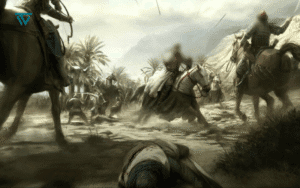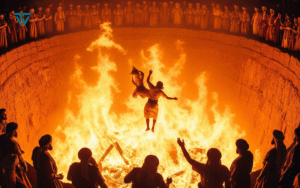Story Behind Muharram, Ashura and Karbala’s Sacrifice

Muharram marks the beginning of the Islamic New Year. However, it brings more than just a turn of the calendar. This month holds deep historical and spiritual significance for the Muslim community (Ummah), offering timeless lessons from the lives of the prophets. To truly appreciate this sacred time, we must understand the story behind Muharram and its profound lessons. The tenth day, Ashura, is especially important, highlighting the broader Muharram significance through pivotal events. Inextricably linked to this day is the heartbreaking story of Karbala, where the grandson of the Prophet Muhammad (peace be upon him), Imam Hussain (may Allah be pleased with him), was martyred. Unfortunately, many people conflate Ashura and Karbala, which is not accurate from a historical or religious perspective. While Karbala was a devastating event that occurred on Ashura, the day’s significance was established long before.
Consequently, this article will explore the true meaning of Muharram, Ashura, and Karbala, their profound lessons, and the recommended practices for Muslims.
Muharram’s Significance: A Sacred and Honored Month
The word ‘Muharram’ literally means ‘forbidden.’ It is one of the four sacred months in Islam (Ash-hurul Hurum), during which Islam strictly prohibits warfare and bloodshed. The Quran and Hadith mention the honor of this month in numerous places. For instance, the Messenger of Allah (PBUH) said, “The best fasting after Ramadan is the fasting of Allah’s month, Muharram.” (Sahih Muslim). The companions of the Prophet also held this month in high regard and meticulously preserved its sanctity. Therefore, it is not merely a month of mourning but a time for deep self-reflection and worship.
The Ancient Story Behind Muharram: Key Events of Ashura
Ashura, the tenth day of Muharram, holds a unique place in Islamic history. On this day, numerous pivotal events related to Allah and His prophets occurred. Specifically, authentic Hadith clearly confirm two major events on this day:
- The Liberation of Prophet Moses (PBUH): A key part of the story behind Muharram involves the liberation of Prophet Moses (Musa). On this day, Allah saved him and his followers from Pharaoh’s tyranny by parting the Red Sea, creating a dry path for their escape.
- The Drowning of Pharaoh: After Moses (PBUH) and his people had safely crossed, Pharaoh and his massive army pursued them. By Allah’s command, however, the sea closed in on them, and Pharaoh and his soldiers drowned. This event serves as a powerful sign for humanity—a vivid illustration of the fall of the oppressor and the victory of the oppressed. (Sahih Bukhari 3397, Sahih Muslim 1139)
While these two events are confirmed, other popular narratives are also associated with Ashura. It is important to note that many of these derive from ‘Isra’iliyyat’ (Israelite traditions) or have weak chains of narration, meaning they are not authenticated by the most rigorous standards. These widely circulated events include:
- Narrations suggest Allah created Adam (PBUH), placed him in Paradise, and later forgave him on this day. (Reported through weak chains)
- Some believe the great flood ended, and Prophet Noah’s (Nuh, PBUH) ark came to rest. (Reported through weak chains)
- Accounts claim Prophet Jonah (Yunus, PBUH) was freed from the belly of the fish.
- Others mention Prophet Joseph (Yusuf, PBUH) was reunited with his father, Jacob (Yaqub, PBUH).
It is important to reiterate that while various books mention these additional events, their authenticity is not established through strong evidence.
The Heartbreaking Story Behind Muharram’s Most Tragic Day: Karbala
The most tragic event to occur on Ashura is the Battle of Karbala. It took place on the 10th of Muharram in the year 61 AH (October 10, 680 CE). On this day, in the desert plains of Karbala, Iraq, the army of the Umayyad caliph, Yazid, martyred the beloved grandson of the Prophet Muhammad (PBUH), Imam Hussain (R.A.), his family, and his companions.
This chapter in the story behind Muharram is a somber one, beginning when Imam Hussain (R.A.) stood against the tyrannical rule of Yazid to uphold Islamic values. His goal was not bloodshed but to restore justice. Despite this, Yazid’s forces brutally besieged him and his small group on the banks of the Euphrates River. They cut off their access to food and water and attacked them in an utterly inhumane environment. The battle was a lopsided conflict, yet Imam Hussain and his followers remained steadfast. His martyrdom is an eternal source of inspiration, representing the ultimate sacrifice for truth and principle.
It is essential to remember: Ashura and Karbala are not synonymous. Ashura was an honored day long before Karbala. Although this tragedy occurred on Ashura, the day’s historical and religious importance is not confined to this single event.
Key Lessons from Karbala
The martyrdom at Karbala carries profound lessons for us all. For instance:
- Stand for Truth Against Injustice: Imam Hussain (R.A.) demonstrated the importance of standing against oppression and falsehood without compromise, even if it means sacrificing one’s life.
- The Power of Sacrifice, Patience, and Courage: Furthermore, the events of Karbala teach us to remain patient in the face of extreme adversity and to trust in Allah.
- The Duty to Uphold Justice: The sacrifice of Imam Hussain (R.A.) is a timeless reminder that establishing justice and upholding Islamic ideals is the responsibility of every Muslim.
Recommended Practices (Sunnah) for Ashura
Observing a fast on the day of Ashura is a highly virtuous act. The Messenger of Allah (PBUH) used to fast on this day and instructed his companions to do so. He said, “Fasting on the Day of Ashura expiates the sins of the preceding year.” (Sahih Muslim)
The Prophet (PBUH) also gave specific instructions on how to observe this fast. To distinguish the Muslim practice from that of others, he recommended fasting for two days: either the 9th and 10th of Muharram or the 10th and 11th.
In addition to fasting, Muslims should engage in other righteous deeds. These include making supplication (Dua), giving charity (Sadaqah), seeking forgiveness from Allah (Tawbah), and dedicating more time to worship.
Common Misconceptions and Prohibited Innovations (Bid’ah)
Unfortunately, some communities have associated certain misconceptions and prohibited innovations (known as Bid’ah) with Ashura. Muslims should avoid these practices and instead focus on authentic teachings. For instance:
- Exaggerated Mourning Rituals: This includes treating Ashura exclusively as a day of mourning through practices like loud wailing, chest-beating, self-harm, and blocking public roads for processions.
- Tazia Processions: Organizing ‘Tazia’ processions and specific mourning gatherings centered on Karbala is not part of the tradition of the Prophet (PBUH) or his companions.
- Special Foods: The tradition of preparing specific dishes and attributing special religious merit to them on Ashura has no basis in Islamic teachings.
These are newly invented practices that detract from the true spirit of the day.
Conclusion
Ultimately, it is essential for all of us to grasp the true Muharram significance. Reflecting on the complete story behind Muharram—from the victory of Moses to the sacrifice of Imam Hussain (R.A.)—allows us to draw practical lessons. This month does not only signal a new year; it reminds us of the importance of steadfastness, sacrifice, and an unwavering commitment to faith and justice. Therefore, let us embrace this month by adhering to the Quran and Sunnah, avoiding cultural innovations, and truly honoring its sanctity in our lives.









